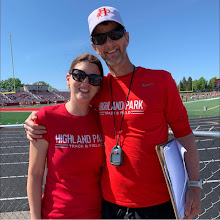After 3 years of blogging I still haven’t really figured out how to handle comments. Do you reply with another comment, reply on their blog, send an email, etc.? I’ve always been one to reply with another comment, that way people can see the string on responses if they’d like. Heck, I don’t even know if people read other people’s comments.
Anyway, sometimes comments come well after the original posting. Since Jeremy had some good thoughts on whether or not recreational runners care about the pros, I thought I’d just repost it here;
I feel like there are two avenues through which the recreational/fitness runner/jogger might care about the pros:Finally, I’m now officially a Garmin user, so I have to be careful about all the bad things I say about Garmin wearers – less I want to refer to myself. First, a question for all the Garmin owners; the first time you strapped it on, did you go out for a “normal” run? My guess is no. You strap that thing on and then sprint out the door trying to prove to that device just how fast you are.
1 - A sense of living vicariously through them. I think that's the hope many have when they look at the thousands-deep marathon and see a latent fanbase. These people know how tough one 5:00 mile is, let alone 26 of them. Shouldn't these folks be thinking, "Wow, it's so cool what Ryan Hall is doing... I wish I could do that and I'll live vicariously through him..."? This is where I think Runnerville does most of its harping -- very few in those thousands-deep marathons know he exists. Will they care? Hard to say until some first effectively markets him and makes them aware.
2 - A sense of relatability, which may or may not be a word. I cannot relate to what Ken Griffey Jr does because I have never tried to hit a 95-mph fastball in front of 50,000 people. But EVERYONE who runs any sort of race experiences the same nerves, the same self-doubt, the same aches, the same pre-dawn Grind-It-Out-runs on 25-degree winter mornings. I would think that this common ground would make the sport of running appealing to runners because they "get it."
All right, maybe you don’t “sprint” but my guess is that you run a little faster than “normal.” At least I thought I was going quicker than normal. In the end, I ran 11 miles and it took about 2 minutes longer than I would have thought based on my pre-Garmin method of determining mileage. I haven’t figured out if that’s good or bad yet.
Quote of the day;
“We had toughened each other measurably. Calloused is the word, physically and mentally calloused.” – Bill Dellinger referring to training with his brother one day

4 comments:
The first time I ran with mine, I was actually less concerned with speed than normal. I took the opportunity to run down different routes than the ones I already had layed out.
In response to the embedded coment you put in- As much as I hate to admit it (being a Reds fan myself) Ken Griffey Junior is more likely to be playing in front of 12,000 people since our fanbase sucks.
On to the actual topic- I probably fall more into the living vicariously group.
My first test drive with my Garmin was to check it out against what I already knew - a route that has been measured with a wheel that I run regularly. It checked out spot on.
Runs at Afton seem to come up short on distance compared to the 25K race course route. With the Trail Mix route at Hyland, I sometimes lose my satellite connection (usually at the south end of the park on the Lake trail). It can also be inconsistant (my 2 laps of Trail Mix along the exact same loop were 0.2 miles different. And my Garmin measured a recent 10K trail race at 5.95 miles where another runner got 5.75 on the same course at the same time. Not sure if that one was accurately measured as a 10K). Guesses are that the steep hills at Afton are not accurately measured from an overhead position regarding the total distance run, and that the heavy tree cover at Hyland is the culprit for dropping the signal. Those are just my guesses. I have no idea about the inconsistancy between different Garmins.
Since most of my runs are on trails that haven't been measured, I find the distance "estimate" somewhat useful, but like any tool, the Garmin has it's limitations. I'm still glad I have one, but I'm not a slave to it. And because I'm a slow runner who's moving towards trail ultras, 10 hours of battery time is lame ;)
Hope that all made sense.
Welcome to the revolution my friend! You know where to come with Garmin questions, I've worn mine on almost every run for over two years. My first runs were actually much slower than normal because I bought it to coincide with my initial low HR training. There are some very cool functions including Virtual Partner, where you can set the watch to 'run' at a specific pace and all you do is keep up to your Virtual Partner. Perfect for an evenly paced tempo run.
I've noticed a few interesting things with since getting my Garmin. One is that it's a lot easier for me to mentally gear up for intervals when I can measure them. Another is that I respond really well to that little virtual partner guy. I just love beating him. And my kids like coming out for little runs when they can watch the GPS data. Nerds like dad!
Post a Comment